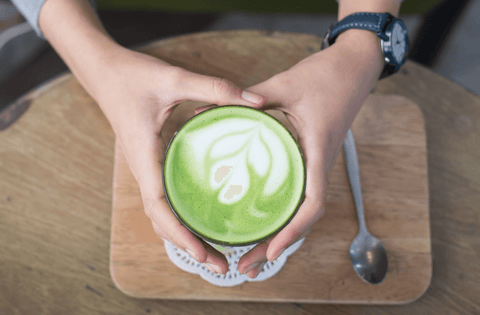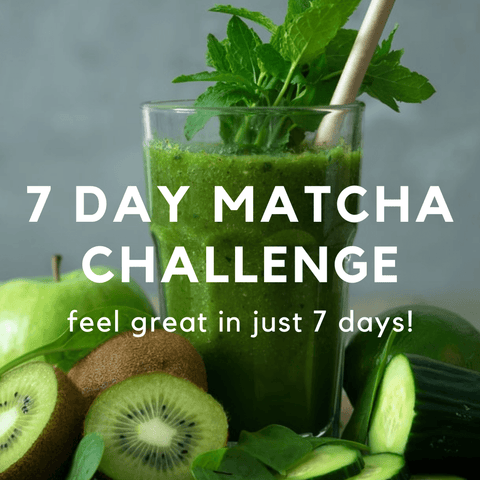Macha and Maccha are common spellings for Matcha (finely ground powder from the leaves of a Camellia sinesis plant). It's one of the healthiest drinks, as you consume the whole leaf, and therefore, all of the nutritional profile.
What spelling is correct: Macha, Maccha or Matcha?
The spelling Matcha is a result of an anglicisation of Japanese for Anglophone consumption, whereas, Macha or Maccha is officially recognised by the Japanese government, and predominantly used by Japanese people.
Arguably, Maccha is the correct spelling for Matcha, however, Matcha is more widely recognised in America and Europe. This is because Matcha means ground (ma) tea (cha) in Japanese, and when written together, the Japanese language splices them with a slight pause.
The spelling of Maccha with two c's can also create confusion with a caffe mocha.
We hope this clears things up. Please do let us know if you have any questions.
A LITTLE MORE ABOUT THE BENEFITS OF MACHA...
MACHA HEALTH BENEFIT #1 - PROMOTES A HEALTHY HEART
Matcha has one of the highest antioxidant ratings. The Oxygen Radical Absorbance Capacity (ORAC) value is 1348 units per gram. That’s 13x the antioxidants in pomegranates and 15x the antioxidants in blueberries.
It's rich in a potent antioxidant called EGCG, containing more than 137 times EGCG present in China Tips green tea and almost 3 times the level of other varieties. EGCG has anti-inflammatory and anti-diabetic properties. Thus, consuming EGCG in moderation can also help lower the level of LDL cholesterol and maintain blood sugar. (1) (2)
Consequently, the risk of coronary heart disease or stroke can be reduced by almost 26% by consuming more than 5 cups of green tea per day as compared with adults who consume less than 1 cup per day. (3) (4)
MACHA HEALTH BENEFIT #2 - FOOD FOR BRAIN
Matcha is a great source of L-theanine. The L-theanine in matcha has anti-anxiolytic properties that are highly beneficial for mental health.
The combination of caffeine, polyphenols, flavonoids, phytonutrients, antioxidants and amino acids found in matcha produces a boost in alpha brain wave production, which encourages relaxation, increases mental clarity, improves cognitive ability, and enhanced mood without inducing drowsiness. (5) (6)(7)
Unlike the caffeine in coffee, which is quickly released into the bloodstream, the caffeine in matcha is slowly released. This is because the caffeine molecules in matcha bind to the catechins. As the catechins break down, caffeine enters the bloodstream slowly over a 6-8 hour period.
This mitigates any usual side effects that you may get with caffeine consumption such as a crash, anxiety, jitters or headaches. Just smooth energy and focus.
MACHA HEALTH BENEFIT #3 - IMPROVES ORAL HEALTH
High level of depression and anxiety can result in poor oral health. Drinking matcha has been proven to help relax and meditate without resulting in symptoms of a caffeine crash. This is why matcha intake can lower overall stress levels that can eventually translate into a relatively lower level of cavities, gum diseases, and tooth sensitivity. (9)(10)
Scientific evidence also suggests that the unique composition of green teas can abolish the incidence of bad breath and prevent tooth decay by repressing bacterial growth. (11)(12)(13)
Surprisingly, in case of curing bad breath, green tea has outperformed other products used for bad breath such as parsley-seed oil, chewing gum, and even mints. This explains the reason for using green tea extracts in oral care products.
MACHA HEALTH BENEFIT #4 - IT'S A POWERFUL CANCER FIGHTER
The abundant levels of antioxidants and chlorophyll help detoxify the blood and support the immune system. This can help our body prevent oxidative stress, which could be responsible for treating illnesses such as mental imbalance, disturbances, anxiety disorder, depression, Alzheimer's and chronic fatigue syndrome. (8)
According to Harvard research, green tea is the best food source of a group of antioxidants known as catechins. Research has shown catechins (such as EGCG) to be more powerful than both vitamins C and E in stopping oxidative damage to cells. They also appear to have other disease-fighting abilities.
It is a proven fact that the natural antioxidants present in the green tea possess significant anti-cancer properties. According to varied researches, green tea can help fight a variety of cancers such as oral, prostate, breast, lung and liver. (14)
Moreover, the research conducted by the University of Salford reveals that matcha's natural compounds can directly help to overcome cancer cell resistance to chemotherapy. (17)
MACHA HEALTH BENEFIT #5 - HELPS AID WITH WEIGHT LOSS
According to research published in the American Journal of Nutrition, matcha has been shown to increase thermogenesis (the rate at which our bodies burn calories) from 8-10% to 35-43%.
A 2005 study in the American Journal of Clinical Nutrition found that participants who drank catechin-rich green tea daily dropped almost twice as much weight in 12 weeks as participants who didn't. They also found that the catechins are associated with reduced BMI and waist circumference.
More recent research shows that matcha can enhance fat oxidation during a 30-min brisk walk especially in females. (19)
Sources:
- https://www.sciencedirect.com/science/article/pii/S0021967303011336?via%3Dihub
- https://www.ncbi.nlm.nih.gov/pubmed/17906191
- https://www.researchgate.net/publication/319420402_Molecular_understanding_of_Epigallocatechin_gallate_EGCG_in_cardiovascular_and_metabolic_diseases
- https://www.health.harvard.edu/heart-health/green-tea-may-lower-heart-disease-risk
- https://www.sciencedirect.com/science/article/pii/S0963996917301941?via%3Dihub
- http://apjcn.nhri.org.tw/server/APJCN/17%20Suppl%201//167.pdf
- https://www.sciencedirect.com/science/article/pii/S0963996917301941?via%3Dihub
- https://www.livestrong.com/article/495126-does-green-tea-detox-your-body
- https://onlinelibrary.wiley.com/doi/abs/10.1111/j.1600-0528.2011.00637.x
- https://link.springer.com/article/10.1007%2Fs00784-010-0437-3
- http://citeseerx.ist.psu.edu/viewdoc/download?doi=10.1.1.919.5990&rep=rep1&type=pdf
- https://www.ncbi.nlm.nih.gov/pubmed/22226360
- https://www.ncbi.nlm.nih.gov/pubmed/1607143
- https://academic.oup.com/ajcn/article/98/6/1676S/4577483
- https://www.sciencedirect.com/science/article/pii/S0091743597902425
- https://www.cancer.gov/about-cancer/causes-prevention/risk/diet/tea-fact-sheet
- https://www.ncbi.nlm.nih.gov/pmc/articles/PMC6128439/
- https://www.ncbi.nlm.nih.gov/pubmed/26836279
- https://www.researchgate.net/publication/322588491_Matcha_Green_Tea_Drinks_Enhance_Fat_Oxidation_During_Brisk_Walking_in_Females




Comments (1)
amazing